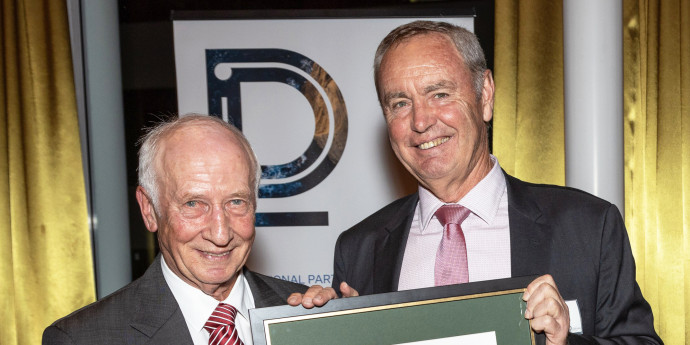The IoD confers Distinguished Fellow award to John Spencer
Long-time company director John Spencer CNZM DistFInstD has been conferred the Distinguished Fellow award by the Institute of Directors.

John Spencer (left) receiving the Institute of Directors’ Distinguished Fellow award from IoD President Alan Isaac.
The award was presented last night during IoD Wellington Branch’s annual dinner.
The Wellington-based director, whose extensive governance experience spans over 17 years, has served on a variety of boards — for private and publicly-listed companies, iwi, state-owned enterprises, crown agencies and cooperatives.
Included in John’s long list of directorships are being chair of Kiwirail (2010-2016), Tertiary Education Commission (2012-2017), Hamilton Airport (2013-2019), Raukawa Iwi Development Ltd (2012-present) and Tainui Group Holdings (2003-2012. He has been director on the boards of Solid Energy NZ (2005-2010), NZ Dairy Group (2009-2014), Mitre 10 NZ (2011-2018) and Tower Insurance (2003-2015), to name some.
“I am deeply honoured, humbled and grateful to receive this award — there is nothing more satisfying than being recognised by your peers,” says John.
Prior to receiving this distinction, John was a Chartered Fellow of the IoD. He is also a Fellow of the Chartered Accountants ANZ. In 2011, he was awarded the Companion of the New Zealand Order of Merit for services to business.
The veteran director shares his thoughts on governance and offers some advice to those starting out as directors (see interview below).
What are some of the lessons you have learned through the years as a director?
“One lesson is around the importance of addressing the difficult issues. It is common practice for a board and management to address issues which are easy to solve — quick wins, as a way of showing progress and getting runs on the board. That’s all well and good so long as major issues are dealt with as well.
“On numerous occasions I have seen the difficult issues put to one side. Often it is hoped that these will go away or solve themselves. That never happens and, in my experience, the longer they are left to fester the worse they become. The board plays a vital role in ensuring that these matters are kept on the board agenda and addressed by management.
“Another lesson is the importance for directors to get out of the boardroom. It’s the only way you will find out what’s really going on and enable you to make informed decisions. Staff also appreciate directors taking the time to visit.
“Rotation of directors is important and needs to be well planned and agreed. As a rule of thumb I consider nine years to be the maximum period a director should serve, excluding exceptional circumstances. Diversity at the board table with regards to background, expertise and gender is also essential.”
You’re a strong supporter of the IoD’s Chartered Membership process. Why do think this is important?
“The IoD is a very different organisation to the one I joined many years ago. The status and standing it has today is a credit to a number of people who have made major contributions to lead the IoD to where it is today.
“The introduction of the Chartered Membership process took the IoD to a new level where it became a truly professional organisation. It also asserted that the IoD understood that governance had to improve its game and move away from being an ‘old boys’ club’ where who you knew was far more relevant to being appointed to a board, than what you knew.
“The need for continuous education is essential in the fast-changing world we live in. For the ongoing prosperity of the country, investors both local and international must have faith in the competency and integrity of governance in New Zealand.
You’ve been a director for over 17 years, how do you choose your directorships?
“Along with the normal due diligence in respect of financial performance and stability of the organisation, the key questions I ask prior to taking on any potential directorships are:
- Can I contribute, not just warm a seat?
- What are the challenges facing the business and the likely outcomes?
- What is the regulatory environment the company operates in and any likely changes?
- What’s the calibre of senior management team and the current board? What is the reputation/style of the chair?
- What are the issues with regards to major shareholders, or minister in the case of a government appointment?
- Does the field in which the company operates interest me?
“I also review the auditors’ annual letter to the board, at least over the last two years, looking for any potential ‘grenades’ that are about to explode.”
What advice would you give to those starting out as directors?
“Being a director is a serious undertaking and you must treat it as such. It is not a part-time job or retirement activity. Make sure you have the time to devote to such an undertaking. Treat governance as a career with the need for continuous education, upskilling and dedication.
“You must join the IoD and take advantage of the many things it offers. If possible, find a mentor who can guide you on your initial journey.
“The best way to get started is to be appointed to one of the many government boards. There are numerous governance positions available for those starting out as directors. While you certainly won’t get rich, you will get that all-important first appointment.
“I have had three IoD Emerging Directors on the boards I have chaired and found this to be an excellent way of introducing potential directors to the dynamics of a board and how it operates. I highly recommend this programme.”
Find out more about the Chartered Membership pathway
Find out more about our development programmes